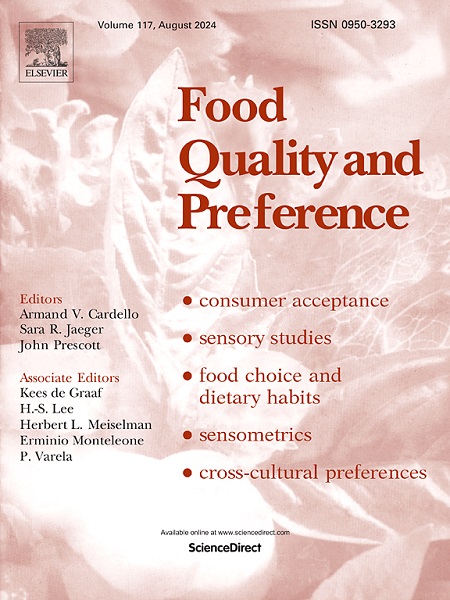动物福利优先:瑞士消费者对乳制品中动物福利、温室气体减排和其他可持续性改进的偏好
IF 4.9
1区 农林科学
Q1 FOOD SCIENCE & TECHNOLOGY
引用次数: 0
摘要
动物福利是可持续食品体系辩论的焦点。然而,动物福利的改善往往意味着生产者要付出更高的成本。我们探讨了瑞士消费者是否愿意通过提高黄油或牛奶的价格为改善动物福利做出贡献。在对 986 名瑞士消费者进行离散选择实验的基础上,我们调查了消费者对乳制品行业中两种动物福利改善措施--散养和农场杀戮--的偏好,以及对有机生产、产品原产地和温室气体减排的偏好。此外,我们还调查了消费者如何看待温室气体减排与动物福利之间的潜在冲突。我们的样本中有一半面临牛奶价格上涨,另一半面临黄油价格上涨。研究结果表明,与分析的其他属性相比,动物福利对消费者的重要性更高。消费者反对因动物福利恶化而导致的温室气体减排,并愿意为改善饲养条件和减少动物宰杀压力买单。动物福利的改善对乳制品行业的参与者至关重要,并为向消费者宣传乳制品的益处提供了有力的论据。本文章由计算机程序翻译,如有差异,请以英文原文为准。
Animal welfare has priority: Swiss consumers’ preferences for animal welfare, greenhouse gas reductions and other sustainability improvements in dairy products
Animal welfare is at the forefront of the debate on sustainable food systems. However, animal welfare improvements often imply higher costs for producers. We explored whether Swiss consumers are willing to contribute monetarily to such improvements through an increase in prices of butter or milk. Based on a discrete choice experiment with 986 Swiss consumers, we investigated preferences for two animal welfare improvements in the dairy industry – loose housing and farm killing – as well as for organic production, origin of product, and greenhouse gas (GHG) reductions. Furthermore, we investigated how consumers perceive a potential conflict between GHG reductions and animal welfare concerns. Half of our sample faced increases in milk prices; the other half faced increases in butter prices. Findings indicate that animal welfare is of higher importance to consumers when compared to the other attributes under analysis. Consumers oppose GHG reductions associated with deteriorations in animal welfare and are willing to pay for improvements in housing conditions and a less stressful killing of the animals. Improvements in animal welfare could be crucial for dairy industry actors and provide strong arguments in communicating benefits of dairy products to consumers.
求助全文
通过发布文献求助,成功后即可免费获取论文全文。
去求助
来源期刊

Food Quality and Preference
工程技术-食品科技
CiteScore
10.40
自引率
15.10%
发文量
263
审稿时长
38 days
期刊介绍:
Food Quality and Preference is a journal devoted to sensory, consumer and behavioural research in food and non-food products. It publishes original research, critical reviews, and short communications in sensory and consumer science, and sensometrics. In addition, the journal publishes special invited issues on important timely topics and from relevant conferences. These are aimed at bridging the gap between research and application, bringing together authors and readers in consumer and market research, sensory science, sensometrics and sensory evaluation, nutrition and food choice, as well as food research, product development and sensory quality assurance. Submissions to Food Quality and Preference are limited to papers that include some form of human measurement; papers that are limited to physical/chemical measures or the routine application of sensory, consumer or econometric analysis will not be considered unless they specifically make a novel scientific contribution in line with the journal''s coverage as outlined below.
 求助内容:
求助内容: 应助结果提醒方式:
应助结果提醒方式:


